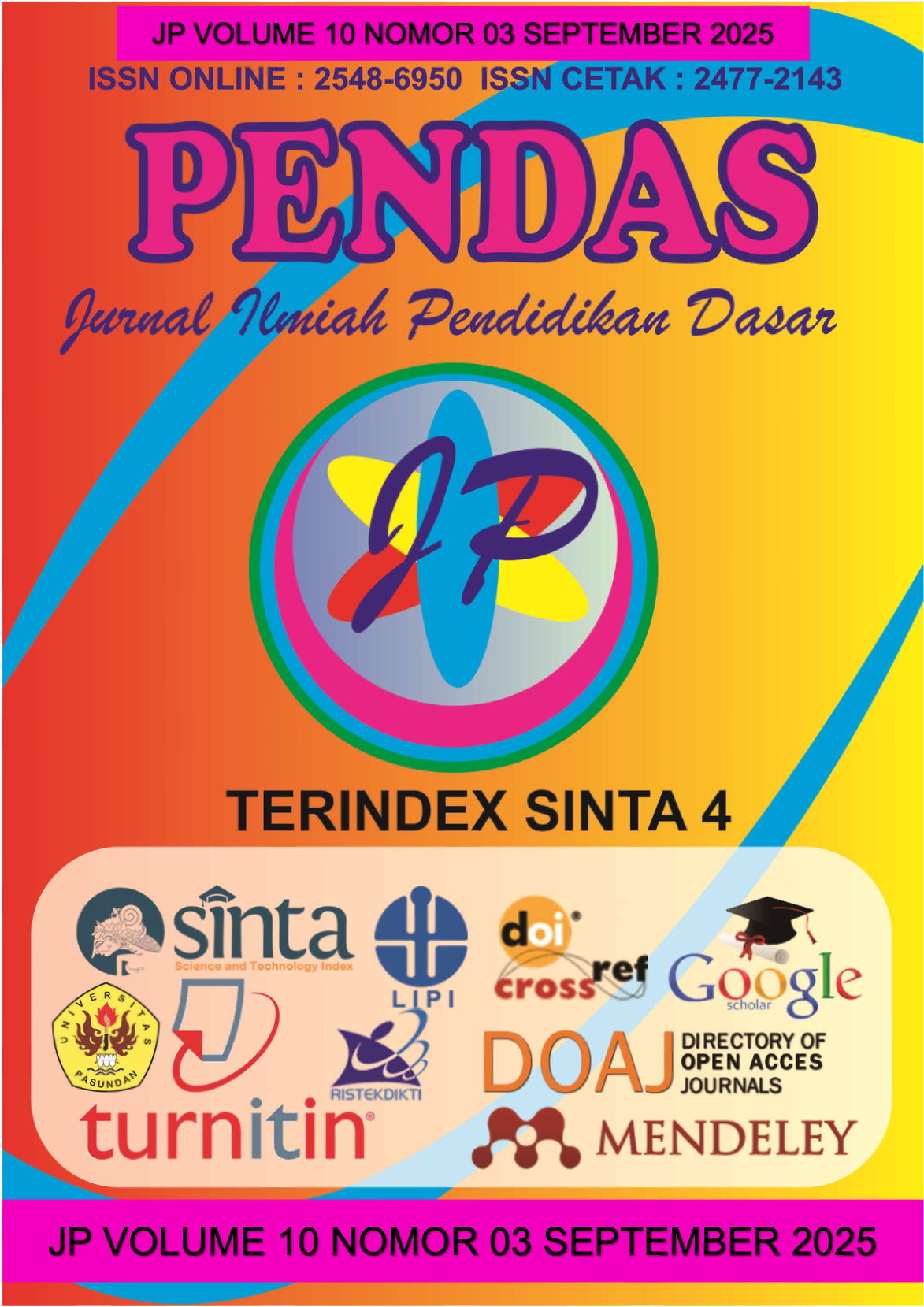PENGARUH PENERAPAN LAYANAN BIMBINGAN KLASIKAL DAN NON KLASIKAL DAN MOTIVASI BELAJAR TERHADAP PRESTASI BELAJAR SISWA SMP NEGERI 4 NABIRE
DOI:
https://doi.org/10.23969/jp.v10i03.34028Keywords:
Classical Tutoring Services, Non-Classical Tutoring Services, Learning Motivation, Learning Achievement, ANOVA, SPSS 27..Abstract
This study aims to analyze the effect of the implementation of classical and
non-classical guidance services and learning motivation on student achievement at
SMP Negeri 4 Nabire. The method used in this study is a quantitative approach with
an experimental design. The instruments used to collect data are a learning
motivation questionnaire and a student achievement test. Data collection was
carried out by distributing questionnaires to students and administering a learning
achievement test after the implementation of guidance services. The data obtained
were then analyzed using the SPSS 27 program with a two-way ANOVA analysis
technique. The results showed that the guidance service method, both classical and
non-classical, had a significant effect on student achievement, with a very high F
value (165.743) and a very low p-value (0.000). In addition, learning motivation was
also found to have a significant effect on student achievement, with an F value of
99.719 and a p-value of 0.000. These findings indicate that learning motivation is a
key factor in student academic achievement. The study also found a significant
effect of the interaction between guidance methods and learning motivation on
student achievement. Students with high learning motivation benefit more from
classical tutoring methods, while students with lower motivation benefit more from
more flexible non-classical tutoring methods. Based on these results, it is
recommended that schools introduce and implement tutoring methods that are
appropriate to students' characteristics and learning motivation, in order to improve
their academic achievement. A more personalized approach in tutoring services and
efforts to improve students' learning motivation will have a positive impact on
academic achievement.
Downloads
References
mereka. Selain itu, motivasi belajar
juga terbukti menjadi faktor yang
sangat signifikan dalam
mempengaruhi prestasi akademik.
Siswa yang memiliki motivasi belajar
tinggi cenderung mencapai prestasi
yang lebih baik. Lebih lanjut,
penelitian ini juga menemukan bahwa
interaksi antara metode bimbingan
dan motivasi belajar mempengaruhi
secara signifikan prestasi belajar
siswa. Siswa dengan motivasi belajar
yang tinggi mendapatkan manfaat
lebih besar dari metode bimbingan
klasikal, sementara siswa dengan
motivasi lebih rendah lebih
diuntungkan dengan metode non-
klasikal yang lebih fleksibel. Implikasi
dari temuan ini adalah pentingnya
penerapan metode bimbingan yang
disesuaikan dengan motivasi belajar
siswa untuk mengoptimalkan prestasi
akademik mereka. Oleh karena itu,
pendekatan bimbingan yang lebih
personal dan berbasis pada
karakteristik siswa dapat
meningkatkan efektivitas
pembelajaran di sekolah. Saran untuk
penelitian dan praktik selanjutnya
adalah agar sekolah lebih
memperhatikan pemilihan metode
bimbingan yang tepat serta berupaya
meningkatkan motivasi belajar siswa.
Pelaksanaan layanan bimbingan yang
fleksibel dan sesuai dengan
kebutuhan individu siswa, serta
pengembangan strategi untuk
meningkatkan motivasi belajar, akan
berdampak positif terhadap
pencapaian akademik siswa.
.
DAFTAR PUSTAKA
Abdurrahman Saleh, M. (2023). Model
Layanan Bimbingan Kelompok
Berbasis Qur’ani Pada (Santri)
Yang Memiliki Insecure Dalam
Mengikuti Pendidikan Di Markaz
Tahfizh Al-Qur’an Al-Farauk
Brebes. Islamic Journal Of
Education, 2(1).
Https://Doi.Org/10.54801/Ijed.V2i
1.166
Amalia Anjani Purba, & Ade Chita
Putri Harahap. (2023). Efektivitas
Layanan Bimbingan Kelompok
Untuk Meningkatkan Resiliensi
Akademik Mahasiswa. G-Couns:
Jurnal Bimbingan Dan Konseling,
7(02).
Https://Doi.Org/10.31316/Gcouns.
V7i02.4596
Arsal, F. R. (2023). Manajemen
Pelaksanaan Bimbingan
Konseling Bernilai Islami. Idaarah:
Jurnal Manajemen Pendidikan,
7(1).
Https://Doi.Org/10.24252/Idaarah.
V7i1.35686
Arsini, Y., Maulida, N., Siregar, S. R.,
& Meliala, A. L. B. S. (2023).
Evaluasi Dan Supervisi Bimbingan
Konseling. Jurnal Pendidikan Dan
Konseling (Jpdk), 5(5).
Https://Doi.Org/10.31004/Jpdk.V5
i5.22782
Asriani, I. (2023). Peningkatkan
Hubungan Sosial Antar Teman
Sebaya Melalui Layanan
Bimbingan Kelompok Siswa Kelas
Ix-A. Jurnal Impresi Indonesia,
2(6).
Https://Doi.Org/10.58344/Jii.V2i6.
2693
Creswell, J. W. (2018). Research
Design: Qualitative, Quantitative,
And Mixed Methods Approaches
(5th Ed.). Sage Publications.
Deci, E. L., & Ryan, R. M. (2000). The
"What" And "Why" Of Goal
Pursuits: Human Needs And The
Self-Determination Of Behavior.
Psychological Inquiry, 11(4), 227-
Downloads
Published
Issue
Section
License
Copyright (c) 2025 Pendas : Jurnal Ilmiah Pendidikan Dasar

This work is licensed under a Creative Commons Attribution 4.0 International License.



















